My Sacred Space: Mimi Arsenault
The Chapel of the Founder in the Basilica dei Santi Giovanni e Paolo in Rome, Italy is sacred for me because St. Paul of the Cross is buried here. I was able to visit this beautiful basilica and spend time in prayer throughout the holy ground.
~ Mimi Arsenault
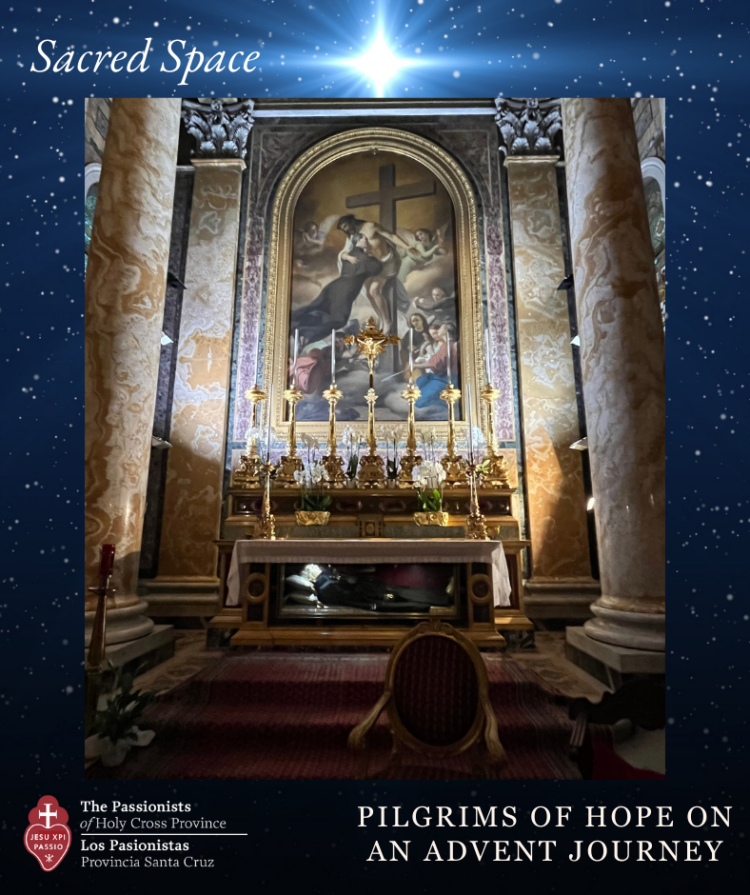
Daily Scripture, December 18, 2024
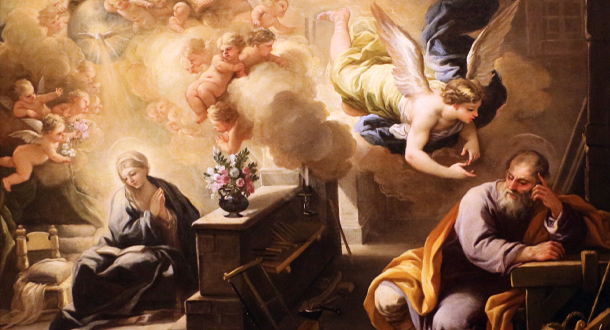
Scripture:
Jeremiah 23:5-8
Matthew 1:18-25
Reflection:
“…Behold the angel of the Lord appeared to him in a dream…”
A familiar story…an angel…and a dream…the story is so familiar (especially at this time of year!) that sometimes we don’t listen, or hear, or engage. Like all of Scripture, the story always has something to say – in particular, something to say to us – to me! what does an angel and a dream have to say to me? Mary and Joseph, both ‘essential’ characters in God’s unfolding plan, encountered an angel and trusted a dream. And God worked a miracle.
As children, we all learned about ‘guardian angels’ – we each had one, sent from God to protect us – remember the images you had as a child trying to figure that out, understand it, embrace it even – some of us named them, maybe even talked with them. Over time that image/concept was tucked away or slipped away and was forgotten.
Mary’s greeting surprised her and scared her a bit Hail favored one, the Lord is with you, and she questioned, she pondered and she stepped into it. Joseph did not want to hurt Mary, he loved her, he was hurt and afraid, in his dream he heard Joseph, son of David, do not be afraid, take Mary into your home – the greeting caught his attention because is deeply touched his experience – he too stepped into it…
Maybe the message for me (us) is to remember we all have an angel and a dream. We all are told Hail favored one, the Lord is with you…do not be afraid…trust the message of your heart – you always have what you need, God always has your back! Maybe the invitation for us is to ponder the ‘angels’ in our lives – those who catch us off guard with a powerful truth that can turn our world upside down! And trust those dreams, where deep in our center, we know whose we are and what we need to do, but, or even if everyone else says otherwise.
We hear this story now, in the home stretch of Advent – each of us, essential characters in God’s unfolding plan – will we notice the angel and trust the dream – and be surprised by the wondrous miracle about to be worked by God.
Faith Offman is the Associate Director of Ministry at St. Paul of the Cross Passionist Retreat and Conference Center in Detroit, Michigan.
My Sacred Space: Ellen Rhatigan
The Monastery garden in Jamaica, NY, is sacred for me because It is an oasis in the middle of a bustling city on top of a large hill that's a terminal moraine, meaning the edge of a glacier, signifying the end of the ice age. The energy of the garden shimmers with the spirit of all those who've prayed there for over a hundred years, and every question or decision I bring to the garden takes decisive shape in my heart while walking back there. It is a sacred gift.
~ Ellen Rhatigan
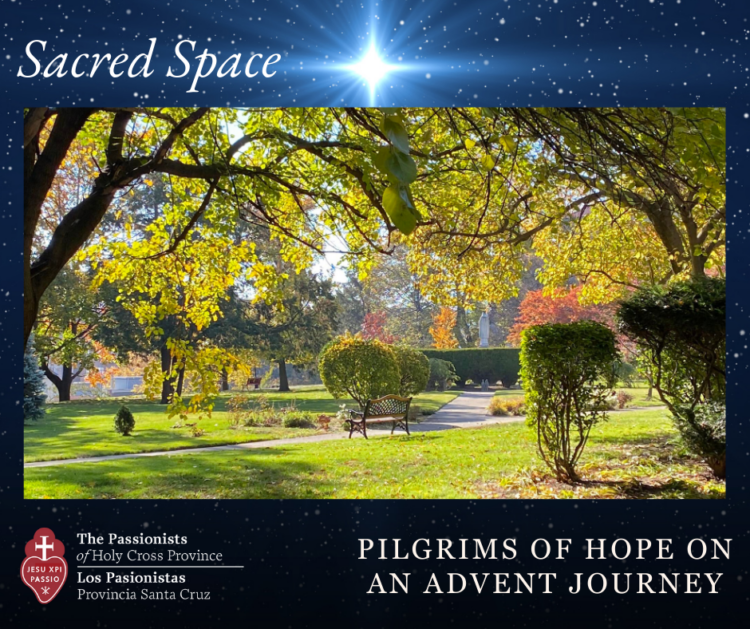
Daily Scripture, December 17, 2024

Scripture:
Genesis 49:2, 8-10
Matthew 1:1-17
Reflection:
In eight days, Christians will again celebrate the miracle that forever changed the world. When God became one of us in Jesus, being born into our world in Bethlehem, we received a promise of hope we never thought possible and a blessing of joy we never believed our hearts could know. This is why Christians profess that in Jesus we meet our king and redeemer, our savior and messiah.
But Jesus will be a king dramatically unlike other kings and a savior it is easy to overlook. Today’s reading from Genesis foretells the royal life of Israel. Jacob announces to his son Judah that he, like other kings, will be like a lion, “the king of beasts,” that everyone fears to approach. By contrast, the psalm response envisions the reign of God that will break into the world in Jesus, by proclaiming: “Justice shall flourish in his time, and fullness of peace forever.” Jesus will rule with the wisdom, mercy, and compassionate goodness of God: “He shall defend the afflicted among the people, save the children of the poor.” Under his kingship, the poor will not be trampled, crushed, and forgotten, but liberated through justice. The suffering will not be overlooked or ignored, but comforted and healed.
The gospel passage from Matthew recounts the genealogy of Jesus. What can seem like a bewildering chronicle of names nearly impossible to pronounce, reveals something wonderful: God works through human beings—including some who were dramatically flawed—to bring about something extraordinarily blessed. But it is easy to miss the blessing because God enters our world not in wealth and majesty, but as a helpless child in a family looking for shelter.
Today’s scriptures remind us that to prepare for the coming of Christ we must look for Jesus where perhaps we least expect to find him. Jesus is right before us, once more beseeching our help, in the stranger, in the lonely and loveless, in the emotionally and spiritually wounded, in the poor and homeless, in people of other races and cultures and religions, who, like Joseph and Mary and Jesus, need assistance. Are our hearts open to receive them? Are our hands ready to help? If our answer is yes, then God can work through us to achieve something extraordinarily blessed, just as he did with Jesus’ ancestors.
Paul J. Wadell is Professor Emeritus of Theology & Religious Studies at St. Norbert College in De Pere, Wisconsin, and a member of the Passionist Family of Holy Cross Province.
My Sacred Space: Marion Bishop
When my son left for college many years ago, I realized that I had a new space to claim as my own. Not wanting Aron to feel “put out,” I asked his permission to use his space as my own sacred space. He enthusiastically said “yes” and so began the transformation.
A large and beautifully hand-carved crucifix given to me by a dear priest friend became the central focus. Everything else was added to create a sacred ambiance. I go to this space often to pray, to be silent, to just “be.”
Even passing by that room is enough to remind me who and whose I am.
~ Marion Bishop
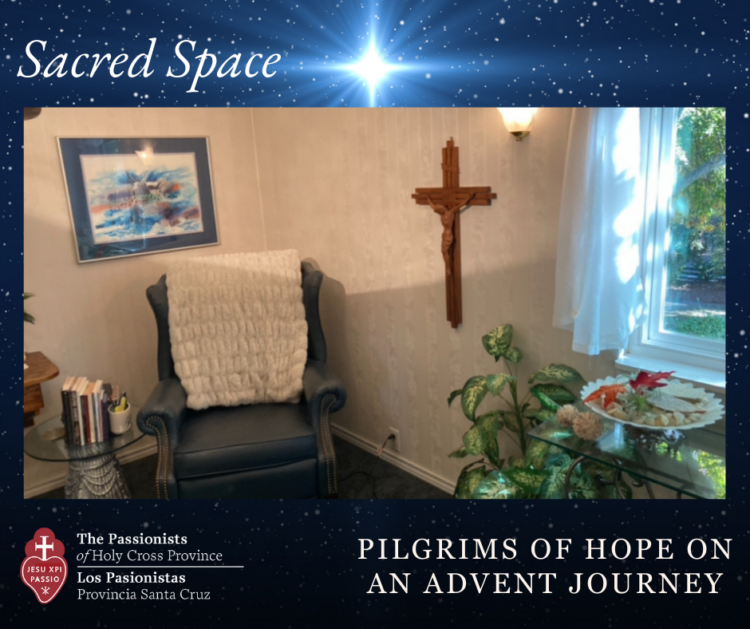
Prayer of Joy
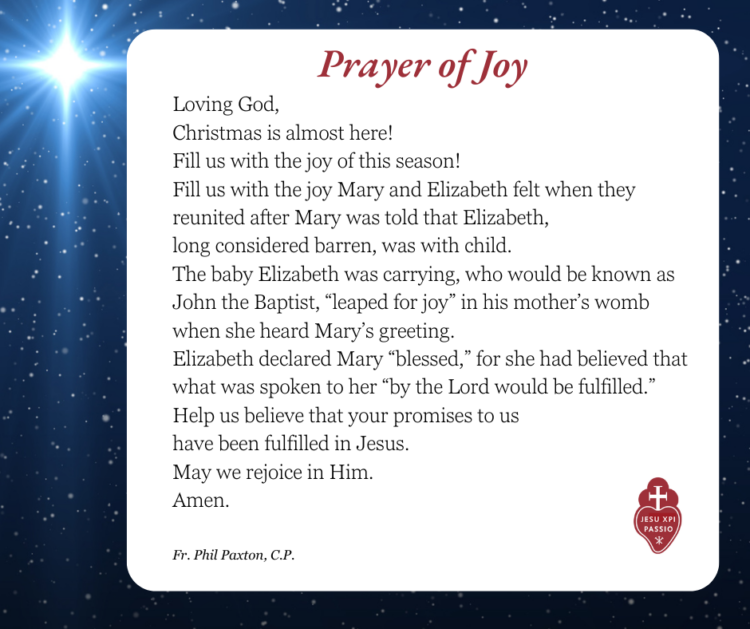
Daily Scripture, December 16, 2024

Scripture:
Numbers 24:2-7, 15-17a
Matthew 21:23-27
Reflection:
We just celebrated the Third Sunday of Advent, Gaudete Sunday. And now, with the entire Church we draw even closer to the great feast of Christmas. Like all of you, I find myself to be swamped with the seemingly unending process of campaigning and posturing for what is undeniably one of the most significant positions in our country. I say “swamped” because it is as if we are treading water these days and not really getting any closer to those elements of truth and clarity that ideally lead us toward a prudent and sound judgment about just who it is that should lead our country. The only authority that is being evoked, it seems to me, is the authority that taps into feelings and emotions of anger and mistrust. Sadly these will not lead us to the best end we can hope for in this great country of ours.
Jesus himself had to face the politics and conflicts of ordinary life himself, didn’t he? Interestingly in our Gospel today we find the Lord being put into an unusual position by the chief priests and elders. Only desirous of trapping Jesus and gaining popular appeal, these devious men challenged the authority and truthfulness of his mission and his teachings. Yet, Jesus refused to give in to the hollow debate and made it very clear that his authority, the truth of all he was about, would one day be revealed without falling into the game of devious words and clever debate.
For me, as we draw closer to Christmas, there is a message here. The Lord comes to shed his light on the world, to bring truth and goodness that will shine in the darkness and will be known for itself. If we want to follow Jesus and bring a real breath of fresh air into the popular arena today perhaps the best thing we can do is to resist the easy siding with those who appeal to our fears and worries and, instead, embrace regardless of cost, the path that comes from the only one who can claim that, “I am the way, the truth, and the light.” Perhaps the invitation at this point in Advent waiting is to breathe in a few deep breaths, listen carefully to all that is said measured by the light of the Gospel and the teachings of Jesus, and then wait even longer until the truth becomes clearer to us. The Lord will show us the way. In the meantime, rejoice for Wisdom is very near!
Fr. Pat Brennan, C.P. is the director of Saint Paul of the Cross Passionist Retreat and Conference Center, Detroit, Michigan.
